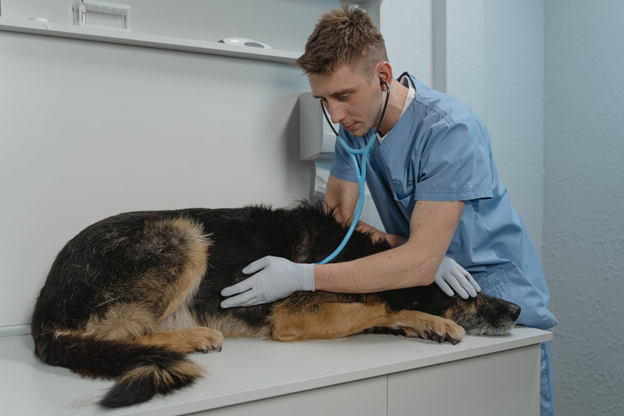Upset stomachs and digestive issues are common in many dogs. While most issues will pass with time and improved nutrition, there are more serious digestive issues that can affect your dog’s health long-term.
This article will walk you through common symptoms and digestive conditions to watch for, as well as whether your dog’s breed is predisposed so you can keep your dog healthy and happy.
Symptoms of Digestive Issues in Dogs
There are many things that can cause an upset stomach in your pup. It’s important to recognize the signs of digestive issues quickly, so you can soothe the issues or seek veterinary attention.
Here are the most common symptoms of digestive issues:
- Vomiting
- Diarrhea
- Constipation
- Lack of appetite
- Increased gas
- Weight loss
- Fever
- Dehydration
- Abdominal pain
- Restlessness, distress, or an inability to get comfortable
- Abdominal enlargement
Your dog is not likely to experience all these symptoms at once. Most commonly, 2 or 3 of these symptoms at a time indicates digestive issues with your dog.
Common Digestive Issues in Dogs
Digestive and gastrointestinal (GI) issues present themselves in many ways. Before diagnosing a problem in your dog, always visit your veterinarian for their professional opinion.
Here are a few of the most common digestive issues seen in dog:
Acute Gastroenteritis
This disorder refers to inflammation in your dog’s gastrointestinal tract (typically their stomach and intestines), and it can be caused by many things but mainly ingesting something that your dog shouldn’t.
Common causes include:
- Eating spoiled or rancid foods
- Eating foods with a high fat content
- Swallowing a foreign object
- Eating toxic plants
- Food allergies
- Stress
Constipation
Constipation can be a symptom of a larger issue, or it can be the main issue that your dog is dealing with. Constipation is common in dogs, and it can be easy to manage with a focus on your dog’s diet and nutrition.
Constipation is typically caused by:
- Lack of exercise
- Dehydration
- Eating indigestible items like bones
- Eating foods with very little fiber
Diarrhea
Diarrhea is also another symptom that can also be the main issue, depending on the cause of your dog’s issues. It’s typically caused by your dog’s nutrition or something they recently ate. Common causes include:
- Change in food
- Eating high-fat foods or table scraps
- Eating spoiled foods
- Stress
- Parasites
Pancreatitis
Pancreatitis is inflammation or an infection in your dog’s pancreas. It can be tough to know the exact cause of your dog’s pancreatitis, and some breeds are more likely to experience it. A few possible causes are:
- Infections
- High fat foods
- Disease
- Trauma
Gastric Dilatation-Volvulus (GDV or Bloat)
Bloat is a potentially life-threatening condition, and if you suspect your dog has it, seek medical attention immediately.
GDV happens when gas builds up in your dog’s stomach which slowly twists it into a knot. It’s typically caused by overeating or eating too quickly.
Dog Breeds Prone to Digestive Issues
Some dog breeds, because of their body structure and breed characteristics, are predisposed to digestive issues. These breeds include:
- Great Danes
- German Shepherds
- Golden Retrievers
- Collies
- Labrador Retrievers
- Yorkshire terriers
Digestive Health Starts with Healthy Nutrition
Many digestive health issues stem from a lack of balanced nutrition in your dog’s life. If you’re looking for better dog food made from healthy, whole food ingredients, shop Health Extension’s range of dry, freeze dried raw, and cups dog foods.





